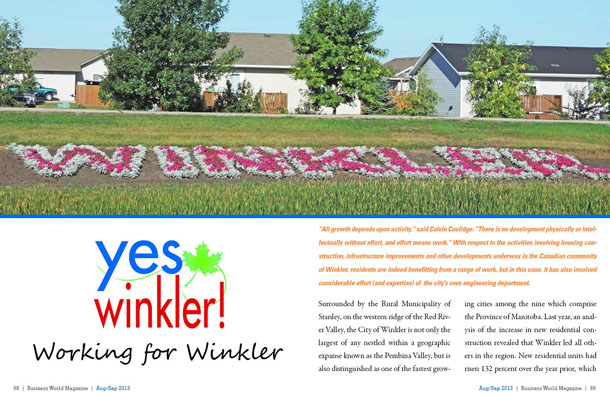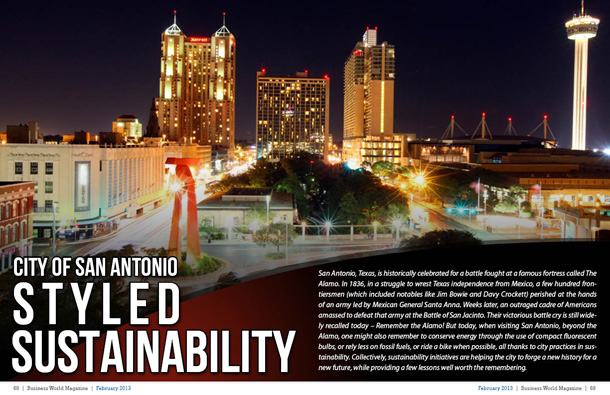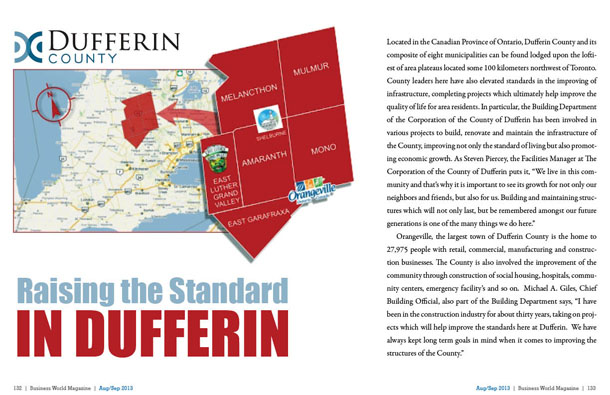Â

“All growth depends upon activity,†said Calvin Coolidge. “There is no development physically or intellectually without effort, and effort means work.†With respect to the activities involving housing construction, infrastructure improvements and other developments underway in the Canadian community of Winkler, residents are indeed benefitting from a range of work, but in this case, it has also involved considerable effort (and expertise) of the city’s own engineering department.
Surrounded by the Rural Municipality of Stanley, on the western ridge of the Red River Valley, the City of Winkler is not only the largest of any nestled within a geographic expanse known as the Pembina Valley, but is also distinguished as one of the fastest growing cities among the nine which comprise the Province of Manitoba. Last year, an analysis of the increase in new residential construction revealed that Winkler led all others in the region. New residential units had risen 132 percent over the year prior, which included a 60 percent leap in new single residential units and a jolting jump in multiple family units of more than 200 percent. “There’s been a real boom in housing construction, and it sure seems like something is happening in Winkler,†says City Engineer Johan Botha.
Now for his part, to be sure, Botha is less interested in determining the causality compelling all this activity, but is more geared toward making sure municipal infrastructure is properly serving the needs of the community. Botha leads one of the smallest, yet arguably most-capable of any city engineering department one will encounter in Canada. Though he’s not one to particularly brag (quickly acknowledging that he has an Engineer-in-Training, technical assistant “wizard†and a wonderful lady who provides administrative support), the fact remains Winkler has saved vast sums of money due to Botha’s engineering prowess, and that’s something Winkler Mayor Martin Harder didn’t have any problem bragging about during a recent ribbon cutting to open the city’s new water treatment plant. In acknowledging the services that will be provided by this $4 million investment, Mayor Hardin also recognized that the planning aspects and the project engineering of the job were completed in-house by Botha and his team.
Of course, this isn’t the first time Botha came to the fiscal rescue. Some years ago, Winkler needed to resolve the refurbishing of an elevated water storage tank. It was determined that costs to refurbish the storage tank would cost upwards of $500,000. Botha ultimately took the elevated tank offline, installed variable frequency pumps, and the system has been working just fine since 2009 (for a prudent cost of only $25,000). The storage capacity lost by removing the tank was replaced by a balancing tank at the new water treatment plant. But again, Botha is not so interested in talking about his professional expertise, rather prefers to focus on how advances in infrastructure are now benefitting residents of Winkler.
To put that perspective, he explains that as much as 60 percent of the local water supply comes from a resource known as the Winkler Acquifer (the rest provided by an enterprise known as the Pembina Valley Water Co.). The city’s former water treatment plant was reaching the end of its lifecycle, but otherwise, protocols relating to the extraction of water found Winkler tapping into that known as the brackish zone. Botha explains that old plant simply couldn’t handle the processing requirements for this water. Fortunately, a funding strategy shared by the city as well as the provincial and federal governments through the auspices of Stimulus Funding helped pave the way for the new reverse osmosis water treatment plant. As Botha’s office provided planning, some design services and all the project engineering, Winkler also worked with firms such as H20 Innovation (an industry leader in the providing of customized, state-of-the-art water treatment solutions) as well as the consulting firm of Tower  Engineering Group who was tasked with structural, mechanical and electrical elements of the job. Cornerstone Construction of Morden was the General Contractor.
They system draws water currently from nine wells which are drilled into the Aquifer, of which one is drawing water from the deep brackish zone The water is treated before going into a  1400m3 balancing tank where it is then partly distributed throughout the community. The plant is functioning 24 hours a day, and the water not being used from this plant during low demand is forced to the City’s big 9ML storage reservoir from where the water is being distributed also to the community during high demand.  Botha says the facility is designed to treat 31 liters of water per second (the equivalent of 700,000 gallons of water per day). The plant is fully automated and monitored by system alarms as well as staff and a diesel-powered generator capable of powering two of the wells and the entire plant is there to mitigate any potential impacts resulting from power outage. Botha says the system is presently only running at 67 percent of its total capacity and therefore can respond to growth in Winkler over the course of its lifespan. Botha says studies are now underway to devise solutions for reducing the reject water flow produced by the water treatment plant, which amounts 30% of the raw water being treated.
In terms of other major infrastructure initiatives, Botha’s department is also taking on a lot of the design, planning aspects and project engineering leading to a new waste water plant. While this initiative has thus far involved in raw sewage characterisation engaging the services of Professor Jan A. Oleszkiewicz in the Department of Civil Engineering at University of Manitoba, complete process design and formulations in drawings of proposed pipe works and mechanical process equipment tender, tender for dome covers, and SCADA tender, total funding for the project has yet to be secured. Botha, nonetheless, envisions that project will come to fruition in the very coming soon. Much work has still to be done however, including the compiling of the Environment Act Proposal.
Caring For Seniors and Skaters
Winkler has also recently broken ground on what will become a major senior center and housing development known as The Buhler Center. Expanding on infrastructure formerly recognized as H.F. Wiebe Active Living Center, the facility has been rebranded following a $1.2 million donation by residents John and Bonnie Buhler (to complement the $2.8 million in provincial and federal funding). During the recent groundbreaking, Candice Bergen, the Minister of State for Social Development and MP for Portage-Lisgar said the facility will prove to become a vital resource of services to area seniors. Located in downtown Winkler, the 8-story development will be comprised by 96 units (48 in affordable housing units, 24 life-lease units and 24 in supportive housing). A new senior activity center will be located on the bottom floor of the development.
The Buhler Center is anticipated to become a model for communities throughout Canada, but also something that will help spur growth in other economic sectors involving senior services and healthcare. A Winnipeg builder known as Boretta Construction has begun work at the site and is expected to be completed within 18 months.
Winkler has thought about the needs of the younger generation too says Botha in reference to a newly opened skate park. Located at the intersection of 15th Street and Grandeur Avenue, The Pine Ridge Skate Plaza reflects a $625,000 investment in support of parks and youth programs. Designed by Vancouver-based New Line Skate Parks, the Pine Ridge Skate Plaza is complemented with engineering innovations in its structural design with the requisite inclines and a bowl-like feature that make it particularly “sick†(which means “cool†or “rad†in skater slang). Young people turned out in droves during the recent opening and by all accounts were fully “stoked†(which translated to “excited†or “really hapyâ€).
More to Come
There are yet still other projects underway in Winkler. At the northern end of the city, a new high school is anticipated to open this September. Known as Northlands Parkway Collegiate, the $32.1 million development comprises more than 112,000 square feet of new construction designed by Prairie Architects and built by Penn-Co Construction. The school will provide arts and academic programming for 800 to 1000 students. Through a partnership with the Garden Valley School Division, Winkler has been paving roads leading to the school and plans additionally call for the developing an enhanced pathway network through the community, which includes sidewalks connecting the new high school to Garden Valley Collegiate, as part of more than $300,000 the city is investing in pathways.
The building of a new police station is expected to be completed by the end of this October.  This project (deploying design services by Funk Architects of Winnipeg and general contractor services from Morden-based Cornerstone Construction) will result in a new station that will be more than three times the size of the former station that was part of the Civic Hall. Botha says the refurbishing and expansion will add offices, cells, a lunch room and gym, interview rooms and enhanced lobby area. “This expansion really enhances the existing Civic Hall building and gives the Police Service a unique identity,†says Botha.
Canada’s Community Infrastructure Improvement Fund has also provided some $65,000 in support of Winkler’s P.W. Enns Centennial Concert Hall. The funds will cover costs in renovations and upgrades to the audio, heating and cooling systems, a project that Botha refers to as “maintenance†more than a major infrastructure project. Yet, when completed, the improvements will reportedly provide make for a more meaningful performing arts experience, as the concert hall traditionally stages more than 40 annual programs enjoyed to audiences totally more than 25,000 people each year.
As Botha observes, something is, indeed, happening in Winkler. For all that happening, it is benefitting residents of all ages by creating new job opportunities, new recreational opportunities, new educational opportunities complemented by new and improved services and resources to support future growth in Winkler, a city that is seemingly changing with the wink of an eye.
For more information, please visit their website at: Â Â The City of Winkler
Preferred Vendors of Choice:








